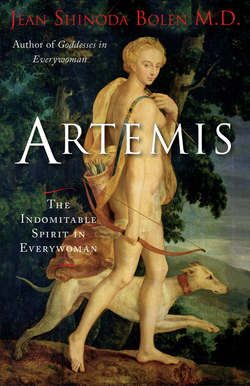Читать книгу Artemis - Jean Shinoda Bolen - Страница 16
На сайте Литреса книга снята с продажи.
The Hunt for the Calydon Boar
ОглавлениеThe boar is enormous. With its sharp curved tusks and its huge feet, it rages through fields, destroying crops and trampling domesticated animals and people who can not get out of its way. It destroys villages and threatens the whole countryside. Artemis, Goddess of the Hunt, fashioned the boar out of mud and gave it life in retaliation against the king who neglected her while making sacrifices to other divinities. Although this is the usual reason given for her wrath, however, another cause may be the awe that people feel toward Atalanta, a mere human. When they look at Atalanta as if she were Artemis, this offends the goddess.
Regardless of the cause, the boar has to be dealt with. The king invites the heroes of Greece to gain honor and reward for themselves by hunting it. Among those who answer the challenge are many of the heroes who went with Jason as Argonauts and later took part in the Trojan War.
The heroes assemble prior to the hunt. The last to arrive are Meleager and Atalanta. The other hunters are scandalized. Even though she is now a famous hunter, how dare a woman join the hunt! There is muttering among the men, with Meleager's uncles speaking aloud against having Atalanta there, using demeaning words. Meleager rises to her defense, draws his sword, and challenges them. Cooler heads prevail and all are reminded that they are, after all, there to kill the boar.
It is a large hunting party of very strong, wily men, each wanting fame and reward for taking down the boar. Some are slashed or gored or trampled in the attempt. The canny boar takes its stand in a place where hunters can not act as a group, but have to attack the boar singly or in pairs. None of them succeed in even wounding the animal, because the boar's pelt is impervious to arrows and spears.
No one draws blood, until Atalanta faces the boar. The boar charges straight at her, its razor-sharp tusks now covered with blood, its massive weight bearing down upon her. Atalanta's bowstring is taut, her arrow at the ready, her eye steady. The boar is almost to her when, with unerring aim, she sends an arrow through one of its eyes, penetrating its brain. It staggers, but is not dead. Now it is Meleager's turn to act. He takes his sword and delivers the death blow.
The boar is dead! Meleager has the right to the pelt, but, instead of claiming it for himself, he gives it to Atalanta. This is truly an important trophy and there is resentment among the others that a woman should have it. It isn't just that it is a symbol of a major heroic achievement that will bring fame to the one who possesses it. This pelt can be made into a garment that is flexible, warm, and impervious to spear and arrow. There could be no better armor.
Meleager's uncles are enraged. Such a prize should not go to a woman! If Meleager doesn't want it for himself, then, they—as his male relatives—should have it and not Atalanta! They speak against her. One of them attempts to snatch the pelt from her. Meleager responds with his drawn sword, lopping off first this uncle's head and then the other's; silencing all protest.
Now it is time to return to the castle with news of the death of the boar. All but Atalanta and Meleager tramp back to the castle, where the king and queen await them. The returning hunters come back with good news—the boar is dead. And then comes the bad news—Meleager has killed his uncles, the queen's brothers.
The queen now learns that Atalanta shot the arrow that drew first blood and Meleager then killed the boar and gave the trophy to her. Then she learns how Meleager was provoked by his uncles' insulting words and their disrespect to Atalanta, and how he killed them. This is too much for her. Maddened by this news, the queen goes to where she hid the locked chest. She opens it and takes out the log given to her by Atropos. Then she orders the servants to build a fire—and throws the log in.
